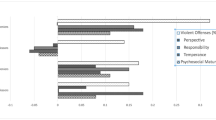Abstract
This study investigated whether defendants’ ages and levels of psychosocial maturity would affect judges’ ratings of juveniles’ adjudicative competence in juvenile and criminal court. Three hundred forty two judges reviewed a forensic psychological report about a hypothetical defendant; only the defendant’s age (12–17) and maturity level (mature, immature) varied across reports. Results revealed a main effect of age, with older juveniles generally deemed more competent, and a main effect of maturity, with mature juveniles generally deemed more competent. No interaction was found. Results suggest that age and maturity play major roles in judicial determinations of juvenile competency.


Similar content being viewed by others
Notes
Confidence intervals were calculated with the square root of R2 for the model and threshold values.
By convention, effect sizes of d = .2, .5, and .8 are considered small, medium, and large, respectively (Cohen, 1992).
References
Cauffman, E., & Steinberg, L. (1995). The cognitive and affective influences on adolescent decision-making. Temple Law Review, 68, 1763–1789.
Cohen, J. (1992). A power primer. Psychological Bulletin, 112, 155–159. Retrieved from http://www.apa.org/pubs/journals/bul/.
Grisso, T. (1997). The competence of adolescents as trial defendants. Psychology, Public Policy, and Law, 3, 3–31. doi:10.1037/1076-8971.3.1.3.
Grisso, T. (2000a). The changing face of juvenile justice. Psychiatric Services, 51, 425–438. doi:10.1176/appi.ps.51.4.425.
Grisso, T. (2000b). What we know about youths’ capacities as trial defendants. In S. Grisso (Ed.), Youth on trial (pp. 139–172). Chicago, IL: University of Chicago Press.
Grisso, T. (2005a). Clinical evaluations for juveniles’ competence to stand trial: A guide for legal professionals. Sarasota, FL: Professional Resources Press.
Grisso, T. (2005b). Juvenile competency to stand trial: Questions in an era of punitive reform. American Bar Association. Retrieved from http://www.abanet.org/crimjust/juvjus/12-3gris.html.
Grisso, T., Steinberg, L., Woolard, J., Cauffman, E. S., Graham, S., Lexcen, F., … Schwartz, R. (2003). Juveniles’ competence to stand trial: A comparison of adolescents’ and adults’ capacities as trial defendants. Law and Human Behavior, 27, 333–363. doi:10.1023/A:1024065015717.
Heilbrun, K., Marczyk, G. R., & DeMatteo, D. (2002). Forensic mental health assessment: A casebook. Oxford, New York: Oxford University Press.
LaVelle Ficke, S., Hart, K. J., & Deardorff, P. A. (2006). The performance of incarcerated juveniles on the MacArthur Competence Assessment Tool—Criminal Adjudication (MacCAT-CA). Journal of the American Academy of Psychiatry & Law, 34, 360–373. Retrieved from http://www.jaapl.org/cgi/reprint/34/3/360.
Oberlander, L. B., Goldstein, N. E., & Ho, C. N. (2001). Preadolescent adjudicative competence: Methodological considerations and recommendations for practice standards. Behavioral Sciences and the Law, 19, 545–563. doi:10.1002/bsl.459.
Poythress, N., Lexcen, F. J., Grisso, T., & Steinberg, S. (2006). The competence-related abilities of adolescent defendants in criminal court. Law and Human Behavior, 30, 75–92. doi:10.1007/s10979-006-9005-4.
Redding, R. E., Floyd, M. Y., & Hawk, G. L. (2001). What judges and lawyers think about the testimony of mental health experts: A survey of the courts and the bar. Behavioral Sciences and the Law, 19, 583–594. doi:10.1002/bsl.455.
Redding, R. E., & Frost, L. E. (2001). Adjudicative competence in the modern juvenile court. Virginia Journal of Social Policy & the Law, 9(2), 353–409.
Redding, R. E., & Reppucci, N. D. (1999). Effects of lawyer’s socio-political attitudes on their judgments of social science in legal decision making. Law and Human Behavior, 23, 31–54. doi:10.1023/A:1022322706533.
Salekin, R. T., Neumann, C. S., Yff, R. M. A., Leistico, A. R., & Zalot, A. A. (2002). Juvenile transfer to adult courts: A look at the prototypes for dangerousness, sophistication-maturity, and amenability to treatment through a legal lens. Psychology, Public Policy, and Law, 8, 373–409. doi:10.1037//1076-8971.8.4.373.
Schetky, D. H. (2003). Juveniles standing trial: Waiver to adult court. Journal of Psychiatric Practice, 9, 465–468. doi:10.1097/00131746-200311000-00010.
Schmidt, M. G., Reppucci, N. D., & Woolard, J. L. (2003). Effectiveness of participation as a defendant: The attorney-juvenile client relationship. Behavioral Sciences and the Law, 21, 175–198. doi:10.1002/bsl.532.
Scott, E. S. & Grisso, T. (2004). Developmental incompetence, due process and juvenile justice policy. University of Virginia Legal Working Paper Series. University of Virginia Public Law and Legal Theory Working Paper Series. Working Paper 11. Retrieved from http://law.bepress.com/uvalwps/uva_publiclaw/art11.
Scott, E. S., Reppucci, N. D., & Woolard, J. L. (1995). Evaluating adolescent decision making in legal contexts. Law and Human Behavior, 19, 221–244. doi:10.1007/BF01501658.
Steinberg, L. & Cauffman, E. (1999). A developmental perspective on serious juvenile crime: When should juveniles be tried as adults? Federal Probation, 63, 52–57. Retrieved from http://www.uscourts.gov/FederalCourts/ProbationPretrialServices/FederalProbationJournal.aspx.
Steinberg, L., & Scott, E. (2003). Less guilty by reason of adolescence: Developmental immaturity, diminished responsibility, and the juvenile death penalty. American Psychologist, 58, 1009–1018. doi:10.1037/0003-066X.58.12.1009.
Viljoen, J. L., & Roesch, R. (2005). Competence to waive interrogation rights and adjudicative competence in adolescent defendants: Cognitive development, attorney contact, and psychological symptoms. Law and Human Behavior, 29, 723–742.
Viljoen, J. L., & Wingrove, T. (2008). Adjudicative competence in adolescent defendants: Judges’ and defense attorneys’ views of legal standards for adolescents in juvenile and criminal court. Psychology, Public Policy, and Law, 13, 204–229. doi:10.1037/1076-8971.13.3.204.
Woolard, J. L., Reppucci, N. D., Steinberg, L., Grisso, T., & Scott, E. S. (2003). Judgment in legal contexts instrument manual. Unpublished Manuscript, Georgetown University, Washington, DC.
Author information
Authors and Affiliations
Corresponding author
About this article
Cite this article
Cox, J.M., Goldstein, N.E.S., Dolores, J. et al. The Impact of Juveniles’ Ages and Levels of Psychosocial Maturity on Judges’ Opinions About Adjudicative Competence. Law Hum Behav (2010). https://doi.org/10.1007/s10979-010-9256-y
Published:
DOI: https://doi.org/10.1007/s10979-010-9256-y




